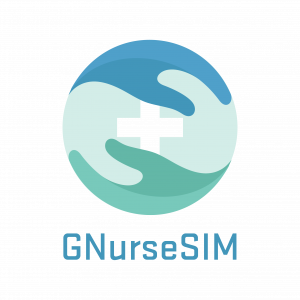83-year-old Antonio with Alzheimer’s disease who lives with his spouse Valerio (75) in an old detached house. Antonio was discharged home the previous day from a week-long interval called “Sulassa Sovussa”, run by a private service provider. The couple’s son has brought Antonio home and promised to take care of his dad’s evening activities. Nurses of home care would conduct a home visit as normal the next morning.
Emotion phase:
Remind the goals (student doing the exercise).
Ask about the feeling during the exercise.
Fact phase
• What happened – describe what happened step by step (student)?
• What went well?
Analysis phase
• Why specific decisions were made?
• How it should be done (ideas are generated by students, the tutor leads to the right conclusions) in a positive matter?
• What to do to make it better (if we run the scenario again, what would you possible do an another way)?
• Students’ questions.
• What do you remember from the exercise (each student says 1 item – preferably everyone should say something different)?
• What should happen (select 3-4 items here that should always be discussed with students regardless of whether they happened or not)?
• Point out step by step what the students’ behavior should look like – exemplary.
• Motivate students to think reflectively while deceiving strengths and correct paths.
• Every student has “a take away message” when they leave the simulation.
Cultural aspects:
1. What similarities did you find with Finnish culture?
2. What differences did you find with Finnish culture?
3. What is important to pay attention when caring an older person with other culture?
TOPIC
Fall prevention
PREBRIEFING
83-year-old Antonio with Alzheimer’s disease who lives with his spouse Valerio (75) in an old detached house. Antonio was discharged home the previous day from a week-long interval called “Sulassa Sovussa”, run by a private service provider. The couple’s son has brought Antonio home and promised to take care of his dad’s evening activities. Nurses of home care would conduct a home visit as normal the next morning.
A nurse from home care is having a home visit to the couple as agreed in service plan of Antonio ja Valerio. The nurse notices all the new issues: Valerio doesn’t remember the nurse’s home visit and he seems confused when he opens the door, and the kitchen is messy. Antonio’s medication dispenser looks a bit strange since there seems to be a new tablet that the nurse does not recognize. Also, Antonio has not taken neither his morning nor evening medications. The nurse has a suspicion that new drug has been prescribed during the interval period since instead of four tablets, the dispenser contains five tablets for morning medications.
Valerio tells that Antonio fell when he went to toilet last night. Antonio claims that he has not hurt himself. The nurse notices a little bruise on Antonio’s forehead. Valerio informs that last night fall was not the first; Antonio has fallen many times recently. The nurse states that she’s going to check a tool-to-prevent falls for both of the couple, Antonia and Valerio.
How to proceed the home visit as a nurse?
REFERENCES, MATERIALS FOR CLASSES
The scenario was prepared based on the content contained in the literature:
- UKK Instituutti: Kaatumisen ehkäisy ammattilaisille Kaatumisten ehkäisy ammattilaisille – UKK-instituutti (ukkinstituutti.fi)
- FRAT- testi 895413f0-490a-4a87-8269-cb99912453bb (thl.fi)
- Timed “Up & Go” -testi https://www.terveysportti.fi/apps/dtk/tmi/article/tmm00153/search/tug%20testi
Teacher’s background material:
- Inclusion of medication-related fall risk in fall risk assessment tool in geriatric care units:
https://bmcgeriatr.biomedcentral.com/track/pdf/10.1186/s12877-020-01845-9.pdf
PREREQUISITES
Competences:
- Application of the most important concepts and knowledge basis of gerontological nursing into practice.
- Knowledge of legislation on gerontological nursing.
- Supporting the achievement and maintenance of the well-being, health and function of the elderly.
- Planning, implementation and evaluation of nursing of the elderly and application of the ethical principles and good practice in nursing in various contexts.
- Managing planning and assessment of gerontological nursing and district nursing with specific attention to the special groups of the elderly.
- Familiarisation with the knowledge basis of accessibility and its application in planning the nursing environment of the elderly.
- The specific features of safe medication of the elderly, its planning, implementation and assessment.
- Humane and symptom-based nursing care of the elderly patients with a terminal illness or chronic disease and support of their significant others.
- Critical information search from the most common data bases of health sciences.
Advanced knowledge.
INTRODUCTION
The scenario is a simulation of a situation in which an older couple lives in their own detached home with home care services. According to a service plan the client has home care visits once a day and once a week a nurse will administer drugs to medication dispenser and checks blood pressure, pulse and over all situation of the couple. Children (a son) will take care of other issues like shopping, hygiene and financial needs.
CURRENT CLINICAL CONDITION
Home care visit according to a service plan.
INTERVIEW
Older person’s functional capacity of daily issues, risk of fall assessment- test by interviewing.

